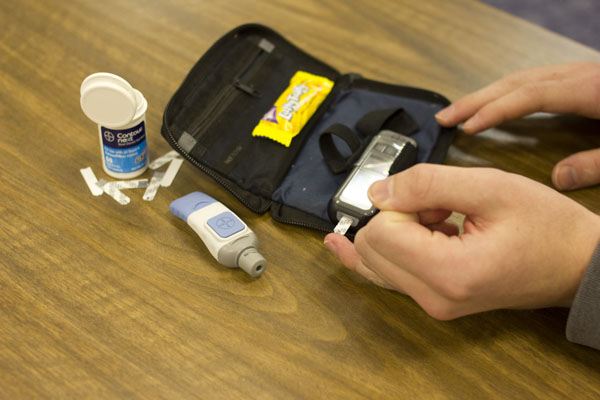It is passing period before period 4, and junior Mark Risinger sits in his AP US History class. Resting on Risinger’s desk is a small black bag,containing various medical items. Risinger takes an item from the back, puts it on his fingertip and pushes on the top. A small needle plunges into his finger, and he removes it and places it onto the glucometer, where a beeping noise tells Risinger that his blood sugar level has been tested. Calmly, Risinger wipes off his finger with a tissue, and puts away the kit.
Risinger is one of the several students at South who have diabetes. Pricking his finger in order to test his blood sugar level is just one of the steps that he must take every day in order to remain healthy, Risinger said. He is also forced to shoot insulin multiple times every day as well as keep track of what he eats and when he eats.
According to www.webmd.com, type 1 diabetes occurs because the insulin-producing cells of the pancreas (beta cells) are destroyed by the immune system. People with type 1 diabetes produce no insulin and must use insulin injections to control their blood sugar. Type 1 diabetes most commonly starts in people under the age of 20 but may occur at any age.
According to Risinger, he was diagnosed with diabetes in January 2012. Being diagnosed was a shock especially because his mom and brother also have diabetes.
“I couldn’t believe it was happening because what are the chances of having three people in one family who have [diabetes,]” Risinger said.
According to Risinger, his life was significantly changed after being diagnosed.
“Immediately your life is thrust into this world where you have to count everything you’re eating, you have to measure your food, you have to prick yourself and give yourself shots of insulin,” Risinger said. “I think the biggest thing is that you lose your sense of freedom.”
According to Risinger, he has gotten used to living with diabetes since being diagnosed.
“It’s definitely become a habit, and I think it has been easier because I watched my brother and mother go through it their entire lives, so I knew I had a support system in my family,” Risinger said. “I know what to do, and I know how to take care of myself, but it’s never fun.”
Junior Julia Packer also has diabetes, but contrary to Risinger, she was diagnosed when she was 6 years old. According to Packer, she vividly remembers being diagnosed.
“I was at my aunt and uncle’s house, and I had just gotten back from the park,” Packer said. “My parents were sitting in the backyard, and they were crying. They told me and I had to immediately go to the hospital. I remember thinking I was dying.”
According to Packer, being diagnosed so young forced her to grow up very fast. However, she believes that because she has had the disease for such a long time, it has become a part of her life.
“I don’t remember not being diabetic, as sad as that is,” Packer said. “It’s a daily routine to me. I don’t really think twice about it, but sometimes I’ll forget that I am because I’m on autopilot with it.”
Freshman Callie Pekosh has also been diabetic since she was young. According to Pekosh, she was also diagnosed when she was 6 years old.
“I was really shocked because I didn’t know what was happening,” Pekosh said. “I was scared. I didn’t really know what it was.”
According to Pekosh, having diabetes has been especially hard for her because she is also an athlete. Pekosh plays soccer and basketball, and diabetes has frequently forced her to miss her practices and games.
“I have to sit out if my blood sugar is too high or too low,” Pekosh said. “It’s frustrating because I have to watch everyone else play, and I can’t.”
Although Pekosh, Packer and Risinger have all gotten used to living with diabetes, they all said that they still go through periods where it is difficult to keep track of.
“Sometimes you get down on yourself,” Risinger said. “Sometimes you have a week where you want to ignore it, and you can’t because it’s harmful to your health to ignore it.”
According to Risinger, going through one of these periods of ignoring some of the necessary steps of living with diabetes causes him to feel sick.
“You get headaches,” Risinger said. “For me, I get in a bad mood when I have high blood sugar. You just feel achy, and you don’t want to do anything. It’s worse because you know you’re ignoring it, and you know you should do something.”
According to Packer, if someone that is diabetic forgets to take insulin or loses track of their blood sugar, it could lead them to pass out or go into a diabetic coma.
“I’ve been pretty lucky; I’ve never passed out,” Packer said. “I have it pretty under control so I’m not ever really too worried about it, but it can be hard.”
Right now, doctors have been searching for a cure for diabetes, according to Packer.
“I definitely think there will be a cure in my lifetime,” Packer said. “I don’t know when but hopefully soon. I’m very hopeful about it.”










